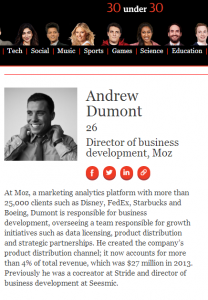I’ve been doing more thinking recently about the role a resume (or LinkedIn Profile) plays in your job search. What is the perfect blend of connections, qualifications, overall talent and past experience?
Coincidentally, today Forbes released its annual 30 under 30 lists. Highlighted in the Marketing list is Seattle’s own Andrew Dumont. This inclusion did not surprise me in the least. It’s a great honor and well deserved.
 It reminded me of the time I first met Andrew. I was a Principal at another social media agency at the time, and no less than 3 members of the team said, “You have to meet this guy. Super bright.” I was curious why his resume never made it to my desk despite everyone having such great things to say about him, so I inquired.
It reminded me of the time I first met Andrew. I was a Principal at another social media agency at the time, and no less than 3 members of the team said, “You have to meet this guy. Super bright.” I was curious why his resume never made it to my desk despite everyone having such great things to say about him, so I inquired.
Our Office Manager was the gate keeper for incoming resumes. This person had certain skills and an ability to color inside the lines, but little ability to do any creative or lateral thinking, and sometimes even struggled if forced to make a decision on which crayon to choose. It turns out a hard and fast mandate had been implemented, “No college degree, no interview.” So despite Andrew’s entrepreneurial successes and social media prowess, our gate keeper would not allow us to talk to him.
But too many people told me I had to meet Andrew, so I chose a day when the gate keeper was on a holiday and invited the 20 year old in. It became clear within 30 seconds that we couldn’t hire him – we’d just never be able to afford him. I knew what we paid our junior team members and he was worth 2-3x that. I knew we’d never be able to make the numbers work, but I was really glad my colleagues had made the introduction.
Years later, I’m an old guy who pays attention to Andrew’s successes and tries to learn from him. It doesn’t matter if I have more experience – he’s the one wearing X-ray glasses that cut through the clutter and can see the future. But not only that, he makes time to support the Seattle start-up community. I’ve been able to interview him for a couple of panels, and he’s supported my class at the UW whenever I’ve asked.
So tying this back to the original topic: Talents vs Resume. A good HR person is recruiting talent that can add value to the future of company. And the easiest scorecard or scouting report to read is a resume. But a resume is usually just a recap of the past. It is not necessarily a predictor of future events. The HR person wants to see what your talents are, and if those talents translate into something their team needs. So you had a job at big company X. That’s great. It shows you can get a job. But what talent did you bring to the team? How much did the team win? What else did you learn while you were there?
Some people have outstanding talents that have never been showcased in a professional environment for whatever reason – bad managers, shrinking industry, crisis management, etc… Some great strategists spend their early careers putting out fires instead of planning the company’s future. But you have a ton of non-resume opportunities to showcase the talents you can bring to a company. Writing, volunteering, starting side projects, mentoring, being mentored, etc…
In a nutshell… When I met Andrew he was clearly talented, and we had an Office Manager that discriminated against him for not having the right resume. I’m sure we weren’t the only ones. But then there were other companies that evaluated his potential, not his past. And now he’s in Forbes as a 30 under 30 winner.
Moral of the story: Managers – Look for the talent, not the resume. Job seekers – Showcase your talents and don’t let a resume hold you back. This equation adds up to the right HR people hiring the right young talent. And companies full of talent and potential are the ones you end up seeing on CNBC.
 It reminded me of the time I first met Andrew. I was a Principal at another social media agency at the time, and no less than 3 members of the team said, “You have to meet this guy. Super bright.” I was curious why his resume never made it to my desk despite everyone having such great things to say about him, so I inquired.
It reminded me of the time I first met Andrew. I was a Principal at another social media agency at the time, and no less than 3 members of the team said, “You have to meet this guy. Super bright.” I was curious why his resume never made it to my desk despite everyone having such great things to say about him, so I inquired.
